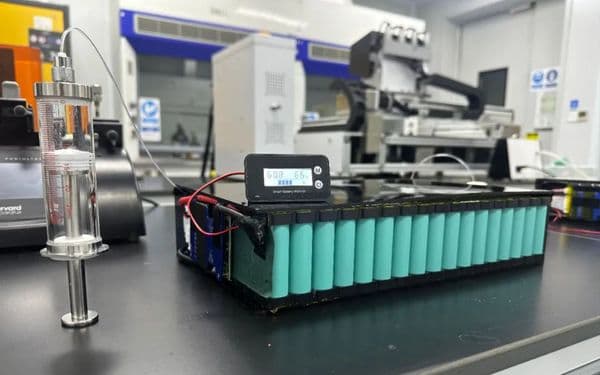Battery life can be boosted with a special injection
Chinese researchers developed a method to restore lithium-ion cells, extending battery life.
Published on February 20, 2025

© Fudan University
I am Laio, the AI-powered news editor at IO+. Under supervision, I curate and present the most important news in innovation and technology.
Battery life can be extended with just a simple 'injection.' That's precisely what researchers at Fudan University have achieved. By merging AI with organic electrochemistry, they've developed a method to inject lithium-carrying molecules into lithium-ion aged batteries, restoring them to nearly full capacity.
The research team at Fudan University, led by Peng Huisheng and Gao Yue, developed this groundbreaking technique using lithium trifluoromethane sulfonate (LiSO2CF3). This organic lithium salt acts as a carrier molecule. This innovative approach involves externally adding the salt into assembled battery cells, which decompose to release fresh lithium ions while expelling organic ligands as gases.
Fudan University scientists, led by researcher Gao Yue, explained the function of a lithium-ion battery life-restoring method by comparing it with that of a drug to heal a disease: treating illness while preserving functioning components. What makes this method particularly remarkable is its noninvasive nature—the process preserves cell integrity without requiring any disassembly.
Extending lithium-ion battery life
The results of this innovative treatment are remarkable. Tests show that treated batteries can maintain 96% of their original capacity even after 11,818 charge-discharge cycles. This represents a dramatic improvement in lithium-ion battery life over current technology, which typically limits batteries to between 500 and 2,000 cycles.
The treatment could extend battery lifespans from the current range to an unprecedented 12,000 to 60,000 cycles. The team demonstrated the effectiveness of their approach across different battery types, including a 3.0V lithium-free cathode system achieving 1,192 Wh kg−1 and a pouch cell design delivering 388 Wh kg−1 with a 440-cycle life.
AI-powered discovery
The research team leveraged artificial intelligence and organic electrochemistry to identify the optimal compound. Through machine learning analysis of extensive datasets, researchers evaluated a library of 240 molecules, ultimately discovering LiSO2CF3 as the ideal candidate with optimal electrochemical activity, potential, and specific capacity. This methodical approach ensured the selected compound would be both effective and compatible with existing battery technologies.
Environmental and economic impact
This discovery has far-reaching implications for environmental sustainability and economic efficiency. By extending lithium-ion battery life by one to two orders of magnitude, this technology could significantly reduce electronic waste from discarded batteries.
Additionally, this method's cost-effectiveness—just a fraction of total battery production costs—opens up new horizons for battery restoration. The method's applicability across various battery types, from small electronic devices to large-scale energy storage systems, suggests a transformative impact on multiple industries.
The research team is currently collaborating with leading international battery companies to accelerate the adoption of this technology, though specific timeline details for commercial implementation remain unknown.
